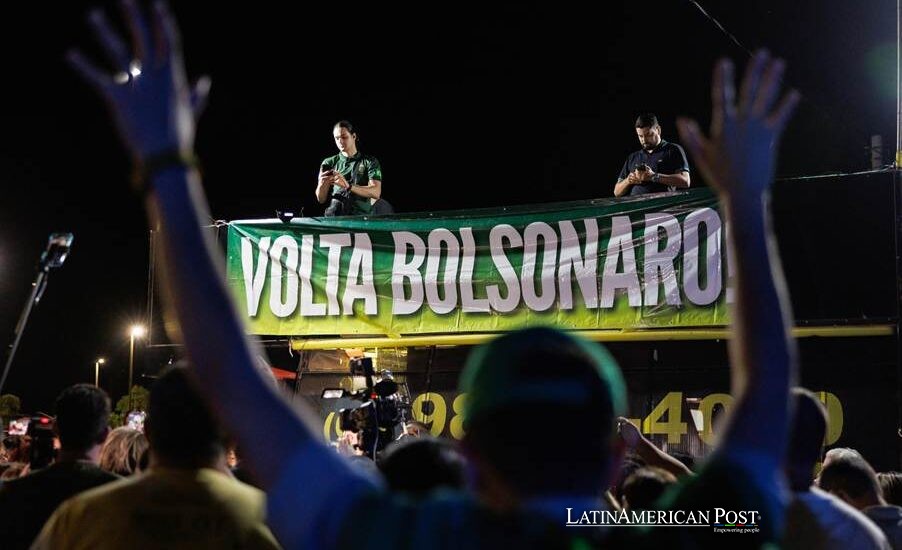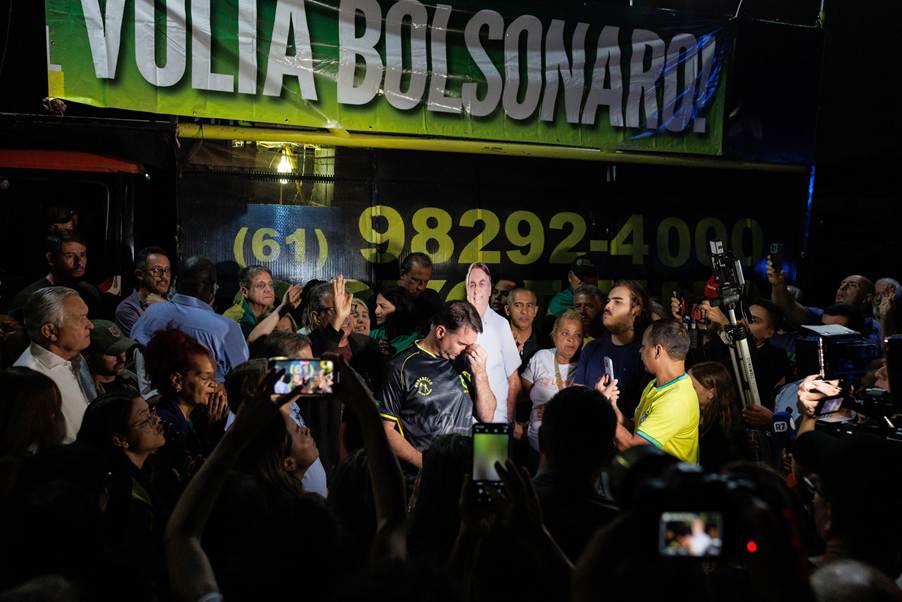Brazil Danced And Prayed As Bolsonaro Faced Prison Walls That Night

Though Jair Bolsonaro was taken into custody Tuesday to begin his 27-year sentence for leading a coup attempt, Brazil’s deeper divide had already surfaced over the weekend, when his court-ordered detention sparked dueling scenes in Brasília: loyalist vigils and jubilant celebrations.
Two Brazils Outside A Federal Police Building
Although Jair Bolsonaro was formally taken into custody on Tuesday to begin his 27-year sentence for allegedly leading a coup attempt, the true mood in Brazil had already revealed itself over the weekend. During those days, the Supreme Court’s order for his preventive detention produced two starkly different scenes in Brasília: on one side, supporters holding a vigil demanding his release; on the other, crowds celebrating his arrest with music and batucada.
By late afternoon last Friday, Brasília had split in two. At the gates of the Federal Police headquarters, a small crowd had gathered in tense silence, clutching flags and Bibles, waiting for a glimpse of the man they still called “captain.” A little farther away, a lone detractor lifted a trumpet to his lips and played the sad notes of a funeral march, a fragile soundtrack for the end of an era.
Hours earlier, Brazil’s Supreme Court had ordered preventive detention for former president Jair Bolsonaro, citing a “concrete risk of flight” and a “threat to public order.” In Brazil’s judicial system, such a decision followed the court’s power to act when a convicted defendant was seen as capable of obstructing justice or fleeing. It marked a decisive step toward closing off Bolsonaro’s options to remain in the political arena, signaling to international observers that the judiciary was willing to confront a former head of state with the same legal tools applied to any other citizen.
There had been no dramatic images of the arrest. Federal Police agents had taken Bolsonaro quietly, without handcuffs and away from cameras, to the Superintendence building in the capital. Inside, according to details released by the Supreme Court and reported by EFE, he was assigned a reserved twelve-square-meter cell, complete with a private bathroom, television, refrigerator, and air conditioning. It was a far cry from the overcrowded cells where so many anonymous prisoners waited on Brazil’s justice system, but still a cell—with a locked door and no balcony to lean on.
The day’s strangest moment had come not from the court but from a video. In it, Bolsonaro calmly admitted to authorities that he had used a soldering iron to tamper with the electronic ankle bracelet that had tracked his movements under house arrest. For his supporters, it was a technicality. For his enemies, it was proof that the man who had railed against “bandits” had been willing to behave like one.
Samba, Beer, And A Carnival For A Conviction
While diplomats and negotiators wrapped up the UN climate summit COP30 in Belém, far to the north in the Amazon, another gathering in Brasília revealed deep societal divisions, helping the audience grasp the emotional and political rifts shaping Brazil.
Bar Pardim had become a symbol of Brazil’s ongoing political struggle, highlighting the societal and political fractures that continue to shape the country’s democracy, helping outside observers understand the deep divisions over Bolsonaro’s imprisonment.
The scene, with samba, beer, and celebration, sharply contrasted with the nearby vigil of Bolsonaro loyalists, underscoring the emotional and political rifts that define Brazil’s current societal landscape and illustrating the deep divisions over Bolsonaro’s arrest.
That explosion of joy had been the mirror image of what was happening across town, near the gated community where Bolsonaro had been living until that morning. There, around a hundred loyalists had gathered for a vigil. There had been no drums, only prayers, tears, and the soft glow of phone flashlights lifted to the sky.

Prayers, Pepper Spray, And An Infiltrator With A Microphone
The vigil had been led by two of Bolsonaro’s sons: Senator Flávio Bolsonaro and Rio de Janeiro city councilman Carlos Bolsonaro, both key figures in the movement that still saw their father as a persecuted leader. The protest had been called the day before as a religious gathering to “pray for his health” and demand his release, but it had quickly become more political than spiritual.
Evangelical pastors had taken the microphone, as had several lawmakers from Bolsonaro’s Liberal Party (PL), all of them faithful to the former president. From atop a truck serving as a makeshift stage hung a giant banner: “Volta, Bolsonaro!” — “Come back, Bolsonaro!”
What followed felt like a mix of church service and campaign rally. People circled a life-size cardboard cutout of Bolsonaro, smiling in permanent victory, and prayed as if he could hear them. “Let’s turn on the lights of our cell phones because the light is coming to chase away the darkness,” Flávio had urged the crowd, insisting that “darkness” had taken over Brazil. He had told them the country was living under a “dictatorship.”
Then, tension had fractured the ritual. A man in a shirt and tie had reached the microphone, presenting himself as another supporter. At first, he had spoken in veiled terms, slipping in subtle criticisms of Bolsonaro between blessings and vague phrases. No one had seemed to notice. Only after a few minutes had he dropped the mask. He had said clearly that Bolsonaro should be tried for the more than 700,000 deaths caused by the COVID-19 pandemic in Brazil.
The police’s pepper-spray intervention amid the chaos that followed his remarks underscored the need for order and safety, reminding onlookers of the volatility of the moment, the fragile line between passionate expression and physical confrontation, and the vital role of peaceful dialogue in such a polarized country.
Among the crowd, Regina Perpetuo, a 52-year-old homemaker, had not hidden her fury. For her, Bolsonaro’s prison was “unconstitutional,” “ridiculous,” and “shameful.” “I have no words,” she had said, visibly shaken and angry, in remarks to EFE. Not far from her had stood Daniel Raposo, a 31-year-old ultra-right activist, who had insisted the Supreme Court had “torn up the Constitution.” He had called on the Armed Forces to intervene “to fight communism” and had named his great hope for the future: “the president of the United States, Donald Trump,” his voice full of a faith that already felt like it belonged to another era.
A Judge, A Risk Of Flight, And A Country Split In Two
For Supreme Court Justice Alexandre de Moraes, the vigil itself had become one more piece of evidence. As rapporteur in the coup-plotting case, he had argued that the event was organized to provoke turmoil and potentially pave the way for Bolsonaro to flee to a foreign embassy. That fear, he had written, justified the move from house arrest to preventive detention.
It had been one more twist in a long and bitter confrontation between Bolsonaro and the Brazilian judiciary. His supporters saw de Moraes as a tyrant in a robe. His critics called the justice one of the few institutional brakes on a movement that had once encouraged crowds to storm government buildings.
In Brasília, the contrast could not have been sharper. On one side of the city, people had danced beneath strings of lights, celebrating a ruling they saw as overdue justice. On the other hand, families had prayed in front of a cardboard figure, convinced their leader was the victim of a vendetta.
Bolsonaro spent that night in his twelve-square-meter cell, its air conditioning humming over the silence. Outside, Brazil carried on—divided, tired, and still arguing over whether the man who had tried to cling to power was finally where he belonged, or whether his imprisonment was a sign that the democracy he had once threatened was now going too far in the other direction.
Also Read: Jalisco Cartel’s European Franchise Falls In Peaky Blinders Bust Operation





